《新目标英语》七年级下册1--7单元重点句型、短语归纳
- 格式:doc
- 大小:125.50 KB
- 文档页数:10

初级中学 班级 姓名 准考证号……………………………密……………………………………………………封…………………………………………线……………………… ……………………………答……………………………………………………题…………………………………………线……………………… 线………………………七年级英语下册units1-12重点短语和句子及范文Unit 1 Can you play the guitar? 一、词汇拓展 1. sing (现在分词)singing 2. dance (现在分词)dancing 3. swim (现在分词)swimming 4.draw (同义词)paint 5. story (复数)stories 6. write (同音词)right 7. drum (复数)drums 8. piano (复数)pianos 9. also (同义词)too/either 10. make (三单)makes (现在分词)making 11.teach (名词)teacher 二、重点短语与句型 1. play chess 下国际象棋 speak English 说英语 play the guitar 弹吉它 want to do …想做…… 2. what club /sports 什么俱乐部 /运动 music /swimming /sports club 音乐/游泳/运动俱乐部 be good at doing sth.擅长做某事 like to do …喜欢做…What about …?…怎么样? tell stories 讲故事the story telling club 讲故事俱乐部3. talk to 跟…..说 write stories 写小说want …for the school show 为学校表演招聘… after school 放学后come and show us 来给我们表演 do kung fu 打中国功夫4. play the drums 敲鼓 play the piano 弹钢琴 play the violin 拉小提琴5. be good with 善于应付(处理)…的;和某人相处好 make friends 结交朋友 help sb. with sth 在某方面帮助某人 help sb. (to) do sth.帮助某人做某事on the weekend 在周末 be free /busy 有空/很忙call sb. at …拨打某人的…号码 need sb./sth. to do …需要某人/某物做…English-speaking students 说英语的学生 join …… the club 加入…俱乐部,be in = join in … 成为…中的一员三、关键句型1. Can you draw? --Yes, I can. / No, I can’t.2. What club do you want to join? -- I want to join the chess club.3. You can join the English club. -- Sounds good.4. I can speak English and I can also play soccer.5. Please call Mrs. Miller at 555-3721.Unit 2 What time do you usually go to school?一、词汇拓展1. up (反义词)down2. brush (三单)brushes3. tooth (复数)teeth4. alway (反义词)never5.early(反义词)late6. work(同义词)job7. night(反义词)day8. half(复数)halves9. run (现在分词)running 10. clean(现在分词)cleaning 11. either …or … (反义词)neither …nor … 12. life(复数)lives 13. taste (三单)tastes二、 重点短语与句型1. get up 起床,站起 get dressed 穿上衣服2. have/take a shower 洗淋浴 brush teeth 涮牙 eat breakfast 吃早餐 What time 几点,何时 go to school 去学校 do homework 做家庭作业 2. at night 在晚上 from …to … 从……到…… in the morning 在上午 go to work 去上班 That's a funny time for … 那是做……有意思的时间。

1—7重点短语1 弹吉他2 下棋3 说英语4 想做某事5 加入音乐俱乐部6 擅长7 讲故事 8 讲故事俱乐部9 喜欢做某事 10 跟某人谈话11. 把某物展示给某人12 和某人相处得好,善于和打交道13 和某人交朋友 14 在周末15. 帮助某人做某事 16. 在某方面帮助某人17. 说英语的学生 18. 弹钢琴19 拉小提琴 20 需要某人做某事21. 教某人做某事 22. 起床;站起23 穿上衣服 24 洗淋浴25.份有趣的工作 26 要么要么; 或者或者27 大量; 许多 28 刷牙29 做某事迟到 30 在周末31 在上学日 32 起得早/晚33 上床睡觉 34 做作业35. 做锻炼 36. 散步37 吃顿丰盛的早餐38 有时间做某事 39 尝起来好40. 一个不健康的习惯 .41. 长达半个小时 42. 到达学校43 到家/到那儿 44 乘火车45 乘飞机/轮船/小船 46 乘地铁47 乘小汽车 48。
骑自行车49 105 50 做某事花费某人时间51 步行去 52 20053.好的锻炼 54. 成百上千的/数以百计的55.坐父亲的车 56. 你觉得怎么样57 需要十分钟的时间到达学校58.过河 59. 乘索道60 10分钟的路 61 坐索道穿过河62. 实现 ` 63. 一个11岁大的男孩64. 像父亲一样对我 65. 为…而感谢66.害怕做某事害怕某物67.迟到 68. 准时69. 听音乐 70. 保持安静71 练习弹吉他 72 考虑做某事73. 把脏盘子留在厨房里把某物落下某地74. 上学日在上学的晚上75.制定规则遵守规则违反规则76 看望朋友 77 留短发78 做某事很开心 79 对某人来说做某事重要的80 对某人严格 81 对某事严格82 记得要做某事 83 记得做过某事84 太多规则 85 太多家庭作业86 太胖 87 学习 /学会做某事88 坚持做某事89 真的吓人91 南非93 用两条腿走路95 整日97 黑白相间的99 来自泰国的学生101 泰国的象征之103 走很长时间105 有食物和水的地方107 处在极大的危险之中109 砍倒树木111 为象牙杀害大象113 由象牙制成的物品115 睡觉117 八小时的睡眠118 忘记要做某事120 种122 各种各样的124 看报纸126. 使用电脑128 出去吃饭130 做汤132 听光盘134 给某人读故事136 和某人起住90。

七下1—6单元必背句子与词组Unit1 Where’s your pen pal from? (ok)1. --你的笔友来自哪里? -- Where is your pen pal from? (无“实义动词e, 用is/are”) --他来自加拿大。
-- He/She is from Canada.同义句:-- Where does your pen pal e from? (有“实义动词e, 用do/does”) -- He/She es from Canada.来自:be from = e from练:They’re _______ Australia, a beautiful country.A. e fromB. es fromC. fromD. for2. --你的笔友来自加拿大吗?-- Is your pen pal from Canada? (用法同上)--是的。
-- Yes, he/she is.同义句:-- Does your pen pal e from Canada? (用法同上) -- Yes, he/she does.3. 他来自澳大利亚:He is from Australia. 他是澳大利亚人:He is Australian.4. --你的笔友住在哪里?-- Where does your pen pal live?--他住在多伦多。
-- He/She lives in Toronto.居住在某地:live in sp练:-- When _____ the girl _____ her homework? -- In the evening.A. does, doesB. does, doC. is, doD. is, does-- _______ your sister have a pen pal? Yes, she _______.A. Is, isB. Does, doC. Can, canD. Does, does-- Ling Tao is a Chinese, but now he _______ in the UK.A. liveB. isC. is fromD. es from5. --你的笔友说什么语言?-- What language does your pen pal speak?--他说英语。

Unit 1 Where’s your pen pal from?一、词汇Canada(名词)Canadaian France(名词)French Japan(名词)Japanese country(复数)countries Australia(名词)Australian China(名词)Chinese 二、词组be from= come form 来自... pen pal=pen friend 笔友live in…..居住 speak English 讲英语 play sports 做体育运动 in November 在十一月a little French 一些法语 all over the world全世界on weekends 在周末 too difficult 太困难Excuse me 对不起,打扰 reach/get to 到达、抵达at the beginning of 在...开始的时候 birthday=date of birth 生日want a pen pal 想要一个笔友 in school在学校arrive at(小地方) /in(大地方)到达 in English用英语at the end of 在...结束的时候 action movie 动作片in the world 在世界上go to the movies=go to the cinema =go to see a film去看电影tell sb. about yourself 告述某人关于你write to sb=write a letter to sb给某人写信a very interesting country 一个非常有趣的国家like doing sth/like to do sth 喜欢做某事(前者强调习惯,后者强调一性)dislike doing sth/dislike to do sth 不喜欢做某事(前者强调习惯,后者强调一性)a little 表肯定 a few 表肯定修饰不可数名词修饰可数名词little表否定 few 表否定三、句型1.Where is your pen pal from?=Where does your pen pal from?你的笔友来自哪儿?She’s from Japan. 她来自日本。

Unit 1. Can play the guitar?重点短语重点句型1. —Can you swim?你会游泳吗?—No,I can’t.不,我不会。
2. Can you play the guitar?你会弹吉他吗?3. I want to join the art club.我想参加艺术俱乐部.4. What club do you want to join?你想参加什么俱乐部?5. You are very good at telling stories.你非常擅长讲故事。
6. Sounds good. But I like to draw,too.听起来不错。
但我也喜欢画画。
7. Then join two clubs—the story telling club and the art club!那么就请加人两个俱乐部——讲故事俱乐部和艺术俱乐部。
8. 一Can Wu Jun speak English?吴俊会讲英语吗?一No,he can’t, but he can speak Chinese.不会,但他会讲汉语。
9. Are you good with old people?你与老人们相处得融洽吗?10. Can you play the piano or the violin?你会弹钢琴还是会拉小提琴?Unit 2 What time do you go to school?重点短语重点句型1. What time do you go to school?你几点去上学?2. 一What time do you usually take a shower,Kick?瑞克,你通常几点钟淋浴?—I usually take a shower at six forty.我通常六点四十淋浴。
3. 一When do you go to work? 你什么时候去上班?一At eleven o’clock, so I’m never late for work.十一点,我上班从来没有迟到4. —What time do they get dressed?他们几点钟穿上衣服?一They always get dressed at seven twenty.他们总是七点二十穿上衣服。

4. draw (同义词) 7. drum (复数)10. make (单三)12. teach (名词) 二、重点短语与句型 1.play chess 下国际象棋 play the guitar 弹吉它 2. be good at 擅长于music /swimming /sports clubbe good at doing sth.= do well in doing sth. 擅长做某事 like to do ⋯ 喜欢做⋯ What about ⋯ ?⋯怎么样?be good at doing ⋯擅长做⋯ tell stories 讲故事the story telling club 讲故事俱乐部 3. talk to 跟⋯ ..说 write stories want ⋯ for the school show 为学校表演招聘⋯⋯ after school do kung fu 打中国功夫 come and show us 来给我们表演 敲鼓 play the piano 弹钢琴拉小提琴 善于应付(处理)⋯的 ;和某人相处很好 结交朋友help sb. with sth 在某方面帮助某人 在周末 help with... 帮助做⋯⋯ 有空 /很忙 call sb. at ⋯拨打某人的⋯⋯号码 需要某人 /某物做⋯⋯2. What club do you want to join?I want to join the chess club.3. You can join the English club. Sounds good.4. I can speak English and I can also play soccer.5. Please call Mrs. Miller at 555 -3721. 一、词汇拓展1. up (反义词 )down2. brush (单三) brushes 4. alway (反义词 )never 5.early ( 反义词)late7. night ( 反义词) day 8. half ( 复数) halves running 10. clean ( 现在分词) nor ⋯ 12. life ( 复数) lives 二、重点短语与句型1. get up 起床,站起 get dressed 穿上衣服 have/take a shower 洗 淋 浴brush teeth 涮牙 eat breakfast 吃早餐 What time 几点,何时 go to school 去学校 do homework 做家庭作业 2. at night 在晚上 from ⋯ to ⋯ 从⋯⋯到⋯⋯in the morning 在上午 go to work 去上班That's a funny time for ⋯ 那是做⋯⋯有意思的时间。
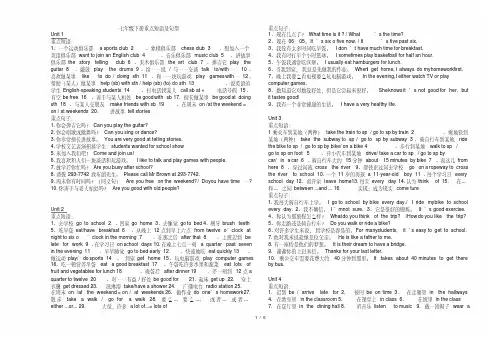
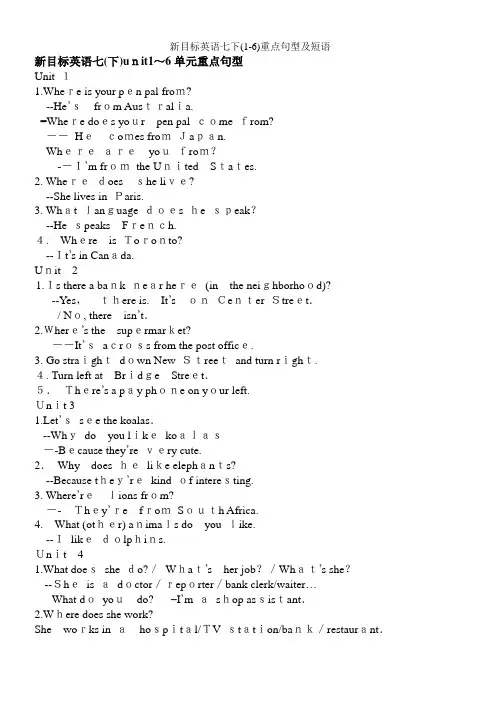
新目标英语七(下)unit1~6单元重点句型Unit 11.Where is your pen pal from?--He’sfrom Australia.=Where does your pen pal come from?--Hecomes fromJapan.Whereareyoufrom?--I’m fromthe United States.2. Wheredoesshe live?--She lives in Paris.3. What language does he speak?--He speaks French.4.Where is Toronto?--It’s in Canada.Unit 21.Is there a bank near here(in the neighborhood)?--Yes,there is.It’sonCenter Street./ No, there isn’t.2.Where’s the supermarket?--It’sacross from the post office.3. Go straightdown New Streetand turn right.4. Turn left at Bridge Street.5.There’s a pay phone on your left.Unit 31.Let’ssee the koalas.--Whydo you likekoalas--Because they’re very cute.2.Why does helike elephants?--Because they’rekind of interesting.3. Where’relions from?--They’re fromSouth Africa.4.What (other) animals do you like.--Ilikedolphins.Unit 41.What doesshe do?/What’s her job?/What’s she?--Sheis adoctor/reporter/bank clerk/waiter…What doyoudo?–I’m ashop assistant.2.Where does she work?She works in ahospital/TV station/bank/restaurant.3.What doesshe want to be?-- She wants to be apolicewoman.4. Whydoeshewant to bea policewoman?--Because it’san exciting job.Unit51.What are you doing?—I’m watching TV.2. What is he/she doing?—He/She is cleaning.3.Whatarethey doing?-They’re talkingonthephone4. Is Nancydoinghomework?--No, she isn’t. She’s writing aletter.5.Do you want to go to themovies?--Yes,I do./Sure./That sounds good.6. When do youwant to go--Let’s go at 8:00.7. Whereishe eating dinner? (现在进行时)--He’s eating dinnerat home.8.Wheredo people play basketball?(一般现在时)--They play basketball at school.Unit61. How’s the weather inFuzhou?=What’s the weather like in Fuzhou?---It’s sunnyand hot. (windyand cool)2.How’s it going?--Pretty good/Great/Notbad/Terrible/Just so-so.3.What do you do when it’s raining?--I stayat home andread a book.现在进行时1.含义:表示现在正在进行或一段时间正在进行的动作标志词:now,look, liste n等。
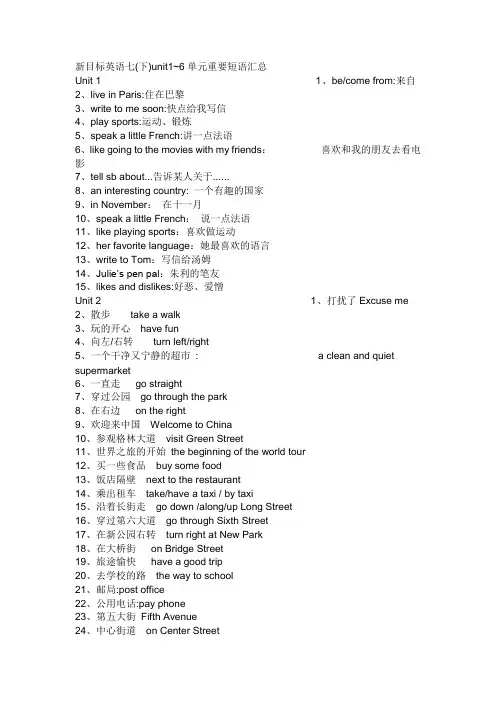
新目标英语七(下)unit1~6单元重要短语汇总Unit 1 1、be/come from:来自2、live in Paris:住在巴黎3、write to me soon:快点给我写信4、play sports:运动、锻炼5、speak a little French:讲一点法语6、like going to the movies with my friends:喜欢和我的朋友去看电影7、tell sb about...告诉某人关于......8、an interesting country: 一个有趣的国家9、in November:在十一月10、speak a little French:说一点法语11、like playing sports:喜欢做运动12、her favorite language:她最喜欢的语言13、write to Tom:写信给汤姆14、Julie’s pen pal:朱利的笔友15、likes and dislikes:好恶、爱憎Unit 2 1、打扰了Excuse me2、散步take a walk3、玩的开心have fun4、向左/右转turn left/right5、一个干净又宁静的超市: a clean and quiet supermarket6、一直走go straight7、穿过公园go through the park8、在右边on the right9、欢迎来中国Welcome to China10、参观格林大道visit Green Street11、世界之旅的开始the beginning of the world tour12、买一些食品buy some food13、饭店隔壁next to the restaurant14、乘出租车take/have a taxi / by taxi15、沿着长街走go down /along/up Long Street16、穿过第六大道go through Sixth Street17、在新公园右转turn right at New Park18、在大桥街on Bridge Street19、旅途愉快have a good trip20、去学校的路the way to school21、邮局:post office22、公用电话:pay phone23、第五大街Fifth Avenue24、中心街道on Center Street25、靠近… next to26、在…对面be across from27、在…和…之间between... and....28、在一个安静/繁忙的街道上on a quiet/busy street29、在附近near here=in the neighborhood30、在你家附近near your home31、在你的右边on your right32、欢迎到…来welcome to...33、花园区the Garden District34、花园游览the garden tour35、步行穿过…take a walk through36、经过…pass...37、有花园的房子… a house with a garden38、….的开头the beginning of...39、一个玩的高兴的好地方a good place to have fun40、在超市买些食buy some food in the supermarket41、去我家的路the way to my home42、一个干净的公园a clean park43、一条安静的街道a quiet street44、一家旧旅馆an old hotel45、一个繁华的超市a busy supermarket46、三个很脏的房间three very dirty roomsUnit 3 1、let sb do sth.让某人做某事:Let him go .让他走吧。
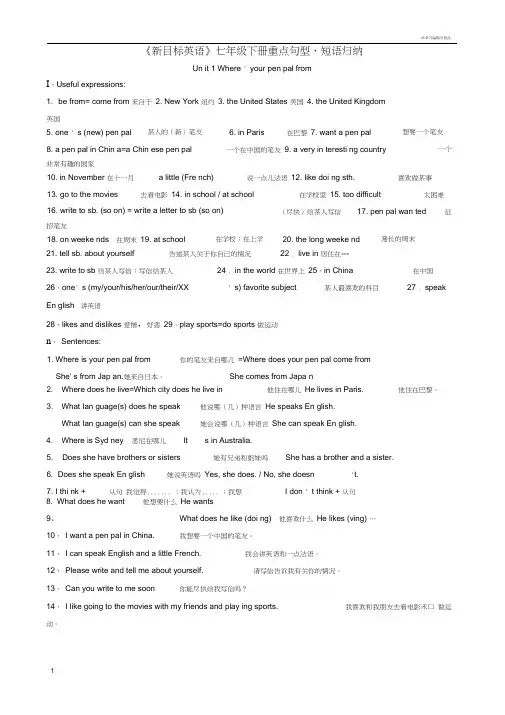
《新目标英语》七年级下册重点句型、短语归纳Un it 1 Where ' your pen pal fromI 、Useful expressions:1. be from= come from 来自于2. New York 纽约3. the United States 美国4. the United Kingdom英国非常有趣的国家招笔友21. tell sb. about yourself告述某人关于你自己的情况22 . live in 居住在---23. write to sb 给某人写信;写信给某人 24 . in the world 在世界上 25、in China在中国26、one ' s (my/your/his/her/our/their/XX ' s) favorite subject某人最喜欢的科目27 . speakEn glish 讲英语28、likes and dislikes 爱憎,好恶 29、play sports=do sports 做运动n 、 Sentences:你的笔友来自哪儿 =Where does your pen pal come fromShe' s from Jap an.她来自日本。
8. What does he want他想要什么 He wants9、What does he like (doi ng) 他喜欢什么 He likes (ving) …10、 I want a pen pal in China. 我想要一个中国的笔友。
11、 I can speak English and a little French. 我会讲英语和一点法语。
12、 Please write and tell me about yourself. 请写信告诉我有关你的情况。
13、 Can you write to me soon你能尽快给我写信吗?14、 I like going to the movies with my friends and play ing sports.我喜欢和我朋友去看电影禾口 做运动。
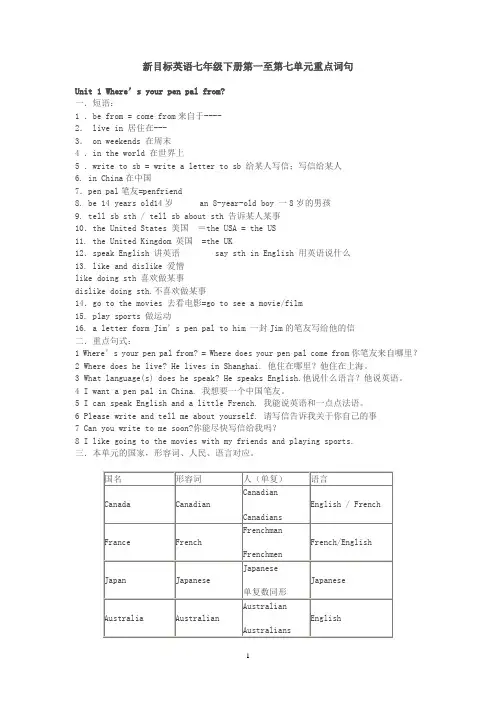
新目标英语七年级下册第一至第七单元重点词句Unit 1 Where’s your pen pal from?一.短语:1 .be from = come from来自于----2. live in 居住在---3. on weekends 在周末4 .in the world 在世界上5 .write to sb = write a letter to sb 给某人写信;写信给某人6. in China在中国7.pen pal笔友=penfriend8. be 14 years old14岁an 8-year-old boy 一8岁的男孩9. tell sb sth / tell sb about sth 告诉某人某事10.the United States 美国=the USA = the US11. the United Kingdom 英国=the UK12.speak English 讲英语say sth in English 用英语说什么13. like and dislike 爱憎like doing sth 喜欢做某事dislike doing sth.不喜欢做某事14.go to the movies 去看电影=go to see a movie/film15. play sports 做运动16. a letter form Jim’s pen pal to him 一封Jim的笔友写给他的信二.重点句式:1 Where’s your pen pal from? = Where does your pen pal come from你笔友来自哪里?2 Where does he live? He lives in Shanghai. 他住在哪里?他住在上海。
3 What language(s) does he speak? He speaks English.他说什么语言?他说英语。
新目标英语七下重点句型及短语Unit 11.Where is your pen pal from?--He’s from Australia.=Where does your pen pal come from?-- He comes from Japan.Where are you from?--I’m from the United States.2. Where does she live?--She lives in Paris.3. What language does he speak?--He speaks French.4. Where is Toronto?--It’s in Canada.Unit 21.Is there a bank near here (in the neighborhood)?--Yes, there is. It’s on Center Street./ No, there isn’t.2.Where’s the supermarket?--It’s across from the post office.3. Go straight down New Street and turn right.4. Turn left at Bridge Street.5. There’s a pay phone on your left.Unit 31.Let’s see the koalas.--Why do you like koalas--Because they’re very cute.2. Why does he like elephants?--Because they’re kind of interesting.3. Where’re lions from?-- They’re from South Africa.4. What (other) animals do you like.--I like dolphins.Unit 41.What does she do?/ What’s her job?/What’s she?--She is a doctor/reporter/bank clerk/waiter…What do you do? –I’m a shop assistant.2.Where does she work?She works in a hospital/TV station/bank/restaurant.3.What does she want to be ?4. Why does he want to be a policewoman?--Because it’s an exciting job.Unit 51. What are you doing?—I’m watching TV.2. What is he/she doing?—He/She is cleaning.3.What are they doing?-They’re talking on the phone4. Is Nancy doing homework?--No, she isn’t. She’s writing a letter.5. Do you want to go to the movies?--Yes, I do./Sure./That sounds good.6. When do you want to go--Let’s go at 8:00.7. Where is he eating dinner? (现在进行时)--He’s eating dinner at home.8. Where do people play basketball? (一样现在时)--They play basketball at school.Unit61. How’s the weather in Fuzhou?=What’s the weather like in Fuzhou?---It’s sunny and hot. (windy and cool)2. How’s it going?--Pretty good/Great/Not bad/Terrible/Just so-so.3.What do you do when it’s raining?--I stay at home and read a book.现在进行时1.含义:表示现在正在进行或一段时刻正在进行的动作标志词:now, look, listen等。
新目标go,for,it,七年级下册单元单词及知识点篇一:新版新目标英语七年级下册各单元知识点汇总新版新目标英语七年级下册各单元知识点汇总Unit 1 Can you play the guitar1. guitar为一种乐器,注意play与表示乐器的名词连用时,前要加定冠词the。
2. join意为―参加(某个组织成为其成员)‖,一般常和介词in连用。
3. have a swim游泳;go swimming去游泳4. ―下棋‖用play chess,而不用play the chess。
5. Painted 派生词:painter n.画家 painting n.画(注意与draw的区别: paint指用颜料等绘画;而draw指用钢笔、铅笔等画。
)6. 注意区分:speak,say,talk和tella) ①say指用语言表达思想,着重说话的内容或强调说话这一动作,不表示说话的性质。
b) ②speak强调说话的动作、声音,而不强调内容。
在正式场合表示发言、演讲,说某种语言用speak。
c) ③talk表示两个人或多个人在一起讲话、谈论(多指随意谈论)。
d)④tell的意思是―告诉,讲述,吩咐‖,讲故事或讲笑话多用tell。
7. 弹钢琴要用play the piano,其中定冠词the不能省略。
8. Show 用法:show作动词,意为―表演,演出,出示……给某人看‖,有时与介词搭配使用,构成show sth. to sb.=show sb. sth.。
show作名词,意为―展览,展出‖。
构成短语on show,意为―在展出‖。
9. 表示―在星期几‖要用介词on。
如:on Sunday―在星期日‖。
10. Little 用法:1)little还有―小的,小巧的‖之意,带有小的可爱之意。
2)注意little与a little 的区别:little与a little都可表示数量,修饰不可数名词。
但little表示否定意义,而a little表示肯定意义。
1人教新目标七年级英语下册单元必背短语句型作文Unit 1 Can 有play the guitar ?一、词组1.play sports after class 下课后做运动2.play volleyball/basketball/football 打排球/篮球/足球3.like to play chess 喜欢下国际象棋4.play computer games 玩电脑游戏5.play games with friends 和朋友一起玩游戏6.play the guitar 弹吉他7.play the drums 打鼓8.play the piano 弹钢琴/9.play the erhu /pipa 拉二胡/弹琵琶10.be good for your healthy 对你的健康有好处11.be good at …/do well in…擅长于…… /在某方面做得好12.be good at doing sth 擅长做某事,14.speak Chinese 讲英语15.tell stories/a story 讲故事get on well with...13.be good with...⎧⎨⎩.........⎧⎨⎩与...相处得融洽对有办法,善于应对的2 tell sb stories tell stories to sb 16. tell us stories tell stories to us ⎧⎫⎬⎪⎪⎭⎨⎫⎪⎬⎪⎭⎩给某人讲故事给我们讲故事 17.write to sb 给某人写信18.show sb sth/show sth to sb.给某人看某物 show 电视节目20.school show 学校文艺表演21.do Chinese kung fu 做/会/练中国功夫22.some people/many people 一些人/许多人23.on weekends/on the weekend 在周末24.go home 回家/get home 到家/at home 在家25.go to school 上学/get to school 到校26.at school 在学校27.teach sb sth 教某人某事/teach me English 教我英语28.teach sb to do sth 教某人做某事/teach me to dance 教我舞蹈29..like to do sth/like doing sth 喜欢做某事30.like to talk with people/like talking with people 喜欢陪人们说话31.make friends with sb 同某人交朋友.()help sb with sth 32.help sb to do sth ⎧⎪⎨⎪⎩在某方面帮助某人帮某人做某事()()help to do sth.32.Help to teach music ⎧⎪⎨⎪⎩帮助做某事帮助教音乐334.want to join the swimming club 想加入游泳俱乐部35.join the art club 加入美术俱乐部36.what club 什么/哪一个俱乐部37,the story —telling club 讲故事俱乐部38.English –speaking students 讲英语的学生39.Students Wanted 招聘学生40.be in/join the school music club.在/加入学校音乐俱乐部里41.relaxing and easy 既放松又简单42.at the old people’s home 在老人之家43.have time/be free 有空,有时间44call …sb at…拨打……同某人联系二.重点句子1.What can you do?你会做什么?2.What dub do you want to join ?你想加入什么俱乐部?3.What sports can you play?你会做什么运动?4.I like to talk and play games with people我喜欢同人们聊天和做游戏。
《新目标英语》七年级下册重点句型、短语归纳Unit 1 Where ’s your pen pal from?Ⅰ、 Useful expressions:1. be from= come from来自于2. New York 纽约3. the United States美国4. the United Kingdom英国5. one ’ s (new) pen pal某人的(新)笔友 6. in Paris 在巴黎 7. want a pen pal 想要一个笔友8. a pen pal in China=a Chinese pen pal 一个在中国的笔友9. a very interesting country一个非常有趣的国家10. in November 在十一月11.speak a little (French)说一点儿法语12. like doing sth.喜欢做某事13. go to the movies 去看电影14. in school / at school 在学校里15. too difficult 太困难16. write to sb. (soon) = write a letter to sb (soon) (尽快)给某人写信17. pen pal wanted 征招笔友18. on weekends 在周末19. at school在学校;在上学20. the long weekend漫长的周末21. tell sb. about yourself告述某人关于你自己的情况22. live in 居住在 ---23. write to sb 给某人写信;写信给某人24. in the world在世界上25、in China在中国26、 one’s (my/your/his/her/our/their/XX’s) favorite subject 某人最喜欢的科目27. speak English讲英语28、 likes and dislikes 爱憎 ,好恶29、play sports=do sports 做运动Ⅱ、 Sentences:1. Where is your pen pal from?你的笔友来自哪儿?=Where does your pen pal come from?She’ s from Japan她.来自日本。
七年级英语新目标下1------7单元精要短语总结1、来自…(2种)___________________________2、住在….._________________________3、一个有趣的国家_______________________________4、会说一点儿英语___________________________5、做运动_____________________6、他最喜欢的科目____________________________7、告诉我关于你自己__________________________8、在中心街上______________________9、在…和..之间_____________________ 10、在…对面__________________________11、给…写信____________________12、紧靠着…_______________________13、在…前面_______________________14、投币电话_______________________15、两个图书室___________________________16、打扰了_______________________17、直走_________________18、向右拐______________________19、在左边_______________________20、在小区内_________________________21、邮局_________________________22、散步__________________23、一个带有有趣花园的小房子_____________________________________ 24、……的开始____________________ 25、一个玩的开心的地方__________________________________26、一条繁华的街道_____________________________________27、到达(2种)_______________________________28、通往我家的路线________________________________ 29、乘出租车________________________30、通过一家银行_______________________________31、沿着长街走___________________________________32、走过公园_________________________________ 33、有一个好的旅行_____________________________34、有几分,有点儿___________________________35别的动物_________________________ 36、对…友好___________________________37、同…一起玩___________________________ 38、在白天________________________39、想成为__________________________ 40、商店管理员__________________________41、从…得到钱____________________________42、在晚上(2种_)________________________43、有点儿危险_____________________________44、工作到很晚_______________________45、出去吃晚饭_________________________ 46、同…交谈__________________________47、关于…而交谈______________________ 48、在医院工作_________________________49、努力学习____________________________ 50、在度假_______________________________句子(4----7)1、我想成为一名演员。
七年级下册英语一到七单元知识点Unit 1 Can you play the guitar?1.play +棋类/球类下……棋,打……球2.play the +西洋乐器弹/拉……乐器3.be good at doing sth. = do well in doing sth. 擅长做某事4.be good for 对…有益(be bad for 对…有害)●be good to sb对…友好(good可friendly,nice,kind 替换)●be good with sb和…相处好=get on/ along well with5.sb. need to do sth 某人需要做某事●need sb. to do sth 需要某人做某事6.can + 动词原形能/会做某事7. a little + 不可数名词一点儿……little +不可数名词(表示几乎没有)8. a few + 可数名词几个few + 可数名词(表示几乎没有)9.join the …club 加入…俱乐部j oin sb.加入某人10.like to do sth. =love to do sth. 喜欢/喜爱做某事11.what/how about +sth. /doing……: ……怎么样?12.help(sb) with sth. 在某方面帮助某人●help sb (to)do sth 帮助某人做某●help oneself to 随便享用●with sb’s help= with the help of sb 在某人的帮助下13.call sb at +电话号码拨打……找某人14.show sth to sb=show sb sth 给某人看某物15.1give sth to sb=give sb sth 给某人某物16.be busy doing sth= be busy with sth 忙于做某事,Unit 2 What time do you go to school?(1)at + 具体时间点在几点(几分)●have time to do sth 有时间做某事(2)eat breakfast/ lunch/dinner 吃早饭/午饭/晚饭(3)thirty\half past +基数词……点半(4)fifteen\a quarter to +基数词差一刻到……点(5)take a/an +名词从事……活动(6)from …to …从……到……(7)taste/sound +形容词尝起来……Unit 3 How do you get to school? 1.take…to …= go to …by…乘…去…2.How do / does (sb)get to …? …是怎样到…的?3.How far is it from …to …? 从…到…有多远?4.It takes sb. some money/time to do sth. 花费某人时间/钱做某事●sb. pay some money for sth. 某人为某物花费多少钱●sb. spend some time/money on sth. 某人在做某事或某物上花费时间/钱●sb. spend some time/ money (in)doing sth. 花费时间/金钱做某事●sth. cost sb. some money 某物花费某人多少钱5.How long does it take to do sth.? …花费多长时间?6.It is + adj. + to do sth. 做某事是….7.Thanks for + n. / Ving 感谢你(做)某事。
《新目标英语》七年级下册重点句型、短语归纳Unit 1 Where’s your pen pal from?Ⅰ、Useful expressions:1. be from= come from 来自于2. New York 纽约3. the United States 美国4. the United Kingdom 英国5. one’s (new) pen pal 某人的(新)笔友6. in Paris 在巴黎7. want a pen pal 想要一个笔友8. a pen pal in China=a Chinese pen pal 一个在中国的笔友9. a very interesting country 一个非常有趣的国家10. in November 在十一月11.speak a little (French) 说一点儿法语12. like doing sth. 喜欢做某事13. go to the movies 去看电影14. in school / at school在学校里15. too difficult 太困难16. write to sb. (soon) = write a letter to sb (soon)(尽快)给某人写信17. pen pal wanted 征招笔友18. on weekends 在周末19. at school 在学校;在上学20. the long weekend 漫长的周末21. tell sb. about yourself 告述某人关于你自己的情况22.live in 居住在---23. write to sb给某人写信;写信给某人24.in the world 在世界上25、in China 在中国26、one’s (my/your/his/her/our/their/XX’s) favorite subject 某人最喜欢的科目27.speak English 讲英语28、likes and dislikes 爱憎,好恶29、play sports=do sports 做运动Ⅱ、Sentences:1. Where is your pen pal from? 你的笔友来自哪儿?=Where does your pen pal come from?Sh e’s from Japan. 她来自日本。
She comes from Japan2.Where does he live?=Which city does he live in? 他住在哪儿?He lives in Paris. 他住在巴黎。
3.What language(s) does he speak? 他说哪(几)种语言?He speaks English.What language(s) can she speak? 她会说哪(几)种语言?She can speak English.4.Where is Sydney? 悉尼在哪儿?It’s in Australia.5.Does she have brothers or sisters? 她有兄弟和姐妹吗?She has a brother and a sister.6. Does she speak English? 她说英语吗?Yes, she does. / No, she doesn’t.7. I think + 从句我觉得……;我认为……;我想……I don’t think +从句8. What does he want? 他想要什么?He wants…..9. What does he like (doing)? 他喜欢什么?He likes (ving)….10、I want a pen pal in China. 我想要一个中国的笔友。
11、I can speak English and a little French. 我会讲英语和一点法语。
12、Please write and tell me about yourself. 请写信告诉我有关你的情况。
13、Can you write to me soon? 你能尽快给我写信吗?14、I like going to the movies with my friends and playing sports. 我喜欢和我朋友去看电影和做运动。
三.本单元的国家,人民、语言对应。
1 Canada---- Canadian---- English / French2 France------ French------French3 Japan------Japanese----Japanese4 Australia----Australian----- English5 the United States------ American---- English6 the United Kingdom---British----- EnglishUnit 2 Where’s the post office?Ⅰ、Useful expressions:1. (the) post office 邮局2. (the) pay phone 公用电话3. near(=around) here 在这儿附近4. on the street 在这条街5. on Center Street 在中心街6. be across from=be opposite 在……对面7. be next to 在……旁边;贴近……next to the supermarket 紧挨着超市8. be between … and … 在……和……之间between the park and the zoo 在公园和动物园之间9. be in front of 在……之前There is a tree in front of the classroom. 课室前面有棵树。
in the front of…在……(内)的前部 There is a desk in the front of the classroom.课室内的前部有张桌子。
10. on Green Street 在格林街11. be behind 在……之后12. go straight 直走13. in the neighborhood=near here=around here=nearby 在附近14. turn left/right 坐/右转on the left/right of…在某物的左/右边 on the left of our school 在我们学校的左边on one’s left/right在某人的左/右边on my left在我左边15. be down Bridge Street 沿着大桥街16. a clean/dirty park 一个清洁的/肮脏的公园17. a quiet/busy street 一条宁静的/繁忙的街道18. a new hotel 一家新旅馆an old hotel 一家旧旅店20. welcome to sp. 欢迎到某地21. the garden district 花园小区22. on fifth Avenue 在第五大道23. enjoy the city’s quiet streets 喜欢/享受这城市静谧的街道24. take a walk 散步25. through the park 穿过公园26. on Center Avenue 在中心大道27. across from the park 在公园对面28. a small house with an interesting garden 一栋有个引人注目的花园的小房子29. (at) the beginning of … (在)……的开始30. visit Bridge Street 游览大桥街31.have fun=enjoy oneself=have a good time + doing 玩得开心32. a good place to have fun 一个好玩的地方33. be hungry 饿了34. buy some food 买点食物35. be arriving 就要到达了36. next Sunday 下周六37. let me tell you sth. 让我告诉你某事38. the way to sp. 去某地的路39. take a taxi 乘出租车40. from the airport 来自机场41. pass a bank 经过一间银行42. go down … 沿着……去43 . go through 从空间穿过 go through the forest 穿过树林44. go across 从表面横过go across the street 横过马路45. at New Park 在新公园46. have a good trip 旅途愉快47. down /along…沿着……(街道)down/along Center Street 沿着中央街48. 到达:get to +地方get here/ there/ home 到这/那/家arrive in +大地方I arrive in Beijing.arrive at +小地方I arrive at the bank. reach +地方49.on + 街道的名称。
Eg: on Center Street at + 具体门牌号+街道的名称Eg: at 6 Center Street50. turn right/left at the first/… turning/crossing=take the first/…turning/crossing on the right/left在第一/第…个路口向右/左转Ⅱ、Sentences:1.Is there a …? 有……吗?Yes, there is. /No, there isn’t. 是,有的。
/不,没有。
2.Where is the supermarket? 超市在哪儿?It’s next to the library. 它在图书馆旁边。
3.Thank you very much. 非常感谢你。
That’s OK./Tha t’s all right./You’re welcome.4.It’s there. 它在那儿。
5.if + 从句如果……(从句中用一般现在时代替将来时)If it rains tomorrow, I won’t go out with you. 如果明天下雨,我就不和你出去。